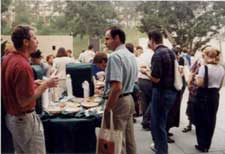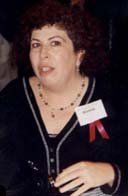1996 National Media Literacy Conference / Los Angeles: Summary Report
From 31 states and 6 countries they came to LA to learn, to share, to network -- and to go back home inspired!
"Media literacy in the U.S. will never be same," noted communications researcher George Gerbner told the assembled participants Sunday morning as the 1996 National Media Literacy Conference came to a close. Howard Rosenberg, media critic for the L.A. Times and panelist for the Sunday morning gathering, also offered an optimistic viewpoint of media literacy. "Having recently found out about media literacy, I'm a total convert. It offers tremendous possibilities," he said.
Indeed, the conference broke new ground as only the second gathering of teachers, leaders, academics, activists in the broad field of media literacy education.
Most importantly, the conference expanded the conversation about the impact of media from traditionally  academic circles to include, for the first time, members of alcohol, tobacco and violence prevention organizations, religious education, professionals in the entertainment and news media, as well as the media arts community and independent film and video producers.
academic circles to include, for the first time, members of alcohol, tobacco and violence prevention organizations, religious education, professionals in the entertainment and news media, as well as the media arts community and independent film and video producers.
The conference was held at UCLA's Sunset Village Conference Center, October 3-6. It was attended by more than 350 educators, media activists and community leaders from 36 states and 9 countries who shared their experience, expertise and ideas on how to bring media literacy education to American schools, afterschool programs, religious and community centers.
Under the theme, "Citizenship in a Media Age: Media Literacy and the Common Good," participants addressed the critical questions about democracy and citizenship in the 21st Century and explored the topics and issues within the media literacy field today.
These included ownership of the news media, the impact of advertising, commercialism in the classroom, the reality of corporate media mergers, the TV ratings controversy and the images of women and minorities in media.
Also featured over the 4-day event were 33 practical hands-on workshops for teaching critical viewing and media literacy in schools, afterschool programs, drug and violence prevention programs, parenting groups, religious and community centers.
The Conference was hosted by the Los Angeles-based Center for Media Literacy in collaboration UCLA's Center for Communication Policy and over a dozen national educational groups.
The Conference officially opened Thursday evening, October 3, at the  Westwood DoubleTree Hotel with a presentation by leading media literacy educator Renée Hobbs entitled The Seven Great Debates of Media Literacy. Hobbs explored the seven key issues in the media literacy field which are currently shaping the direction of media literacy education in the U.S. After the presentation, a decorative ballot box was provided for the audience to cast their "vote" on where they stand on each of the issues.
Westwood DoubleTree Hotel with a presentation by leading media literacy educator Renée Hobbs entitled The Seven Great Debates of Media Literacy. Hobbs explored the seven key issues in the media literacy field which are currently shaping the direction of media literacy education in the U.S. After the presentation, a decorative ballot box was provided for the audience to cast their "vote" on where they stand on each of the issues.
On Friday morning, the conference moved to UCLA's Sunset Village Conference Center for the beginning of two full days of plenaries and workshops. In the Northwest Campus Auditorium, CML executive director, Elizabeth Thoman opened the morning session with a brief address and then introduced a videotaped welcome to the participants by First Lady Hillary Rodham Clinton.
The morning plenary began in full swing with a discussion panel on citizenship and education for the 21st century with California Assemblywoman Sheila James Kuehl, media historian Carlos E. Cortés, and Director of the Voice of America, Geoffrey Cowan. The panel was moderated by Jeff Cole of the UCLA Center for Communication Policy.
After a brief morning break, a "keynote conversation" on the power of storytelling followed. Moderated by media literacy educator Deborah Leveranz, it featured Hollywood screenwriters Winnie Holtzman (My So-Called Life), Patrick Sheane Duncan (Courage Under Fire) and Paris Qualles (Tuskagee Airmen) in a lively dialogue with invited panelists and teachers, Lauryn Axelrod, Clifford Cohen and Quito Hernandez.
Friday afternoon was filled with scheduled workshops and presentations. Participants also had a chance to visit the Media Literacy Bookstore and Resource Room to peruse, examine and purchase the many media literacy books, videos and curriculum on display. The conference also featured a CyberCafe where participants surfed the Web for media literacy resources on the Internet and checked email.
On Saturday morning, the conference reconvened at the Sunset Village Conference Center for another morning of workshops and presentations.  After a box lunch where participants could gather with others in color-coded special interests tracks, participants chose to attend one session in two sets of three mini-plenaries. The first set of mini-plenaries, "The Worlds of Media Literacy" explored media literacy education where it happens: in the home, school and community.
After a box lunch where participants could gather with others in color-coded special interests tracks, participants chose to attend one session in two sets of three mini-plenaries. The first set of mini-plenaries, "The Worlds of Media Literacy" explored media literacy education where it happens: in the home, school and community.
THE WORLDS OF LITERACY MEDIA
"Violence-Free TV?: Television Ratings and the V-Chip" explored concerns over violence on television and presented strategies to help parents manage their family's television viewing. It featured panelists Barbara Wilson, (UC, Santa Barbara); Ron Cohen (National Chair, Canadian Broadcast Standards Council); Jeff Cole (UCLA Center for Communication Policy) and was moderated by Bobbi Eisenstock, (Cal State, Northridge).
"This Class Brought to You By...: The Rise of Classroom Commercialism" looked at the impact of corporate sponsorship of educational programs and materials in the schools. Moderated by Brian Stonehill (Pomona College) the panelists included Linda Brown (Discover Communications); Marianne Manilov (UNPLUG); Frank Dawson (TV producer and English teacher now at Crenshaw H.S.); and Bob McCannon (New Mexico Media Literacy Project).
"Planet Disney: Media Monopolies and the Disappearance of Public Space" critically addressed the media monopoly and the implications of a few corporations controlling both the conduit and content to the world's information. Moderated by Janine Jackson (Fairness & Accuracy in Reporting), it featured panelists George Gerbner (Cultural Environment Movement); Susan Faludi (Backlash); and Robert McChesney (Telecommunications, Mass Media and Democracy).
After a quick break, the second set of mini-plenaries, "Touchstones of Media Literacy" explored major issues within media literacy education.
TOUCHSTONES OF MEDIA LITERACY
"Swoosh! You're Sold!: Growing Up in a Consumer Culture" discussed the impact of advertising and consumerism upon the health and well-being of children. It was moderated by Makani Themba (Praxis Project) and paneled by Jean Kilbourne (Still Killing Us Softly) and Leslie Savan (The Sponsored Life).
"Who Owns the News: Media and the U.S. Political and Economic Agenda" addressed the political implications of a news media  increasingly packaged as entertainment and featured a mostly L.A.-based panel of guests: Karen Grigsby Bates (Los Angeles Times); John Culliton (General Manager, KCBS-LA); Danny Schechter (Globalvision) and Warren Olney (host of Which Way, L.A.?).
increasingly packaged as entertainment and featured a mostly L.A.-based panel of guests: Karen Grigsby Bates (Los Angeles Times); John Culliton (General Manager, KCBS-LA); Danny Schechter (Globalvision) and Warren Olney (host of Which Way, L.A.?).
"Broads and Brothers: Representation of Women and People of Color" made the connections between media images of women and people of color and their political representation and economic power. Moderated by Helen Zia (Ms. magazine), it featured panelists Susan Douglas (Where the Girls Are); Sut Jhally (Dreamworlds II) and Herman Gray (Watching Race).
After an evening reception on the Terrace, participants re-gathered in the Northwest Campus Auditorium for the west coast premiere of the film The Ad and the Ego produced by California Newsreel. Conference speakers Jean Kilbourne and Sut Jhally who appeared in the film facilitated an informal and lively discussion along with the film's producer Larry Adelman following the screening.
On Sunday morning the conference concluded with brunch and the lively panel "Media at the Millenium: Conversations with Critics," featuring pulitzer-prize winner Howard Rosenberg (Los Angeles Times); Elvis Mitchell (National Public Radio), Ella Taylor (LA Weekly) and Marc Cooper (New Times). L.A. media educator Barbara Osborn moderated.
The 1996 National Media Literacy Conference is over but the conversation about the future of media literacy education in the U.S. continues. The National Telemedia Council, along with other leading organizations, is currently planning the 1997 Media Literacy Conference tentatively scheduled for October 17-19, 1997 in Minneapolis, Minnesota.
In the meantime, this year's conference showed that media literacy education in the U.S. is alive, well and thriving. Thanks to all the participants, speakers, presenters, volunteers who made the conference a dynamic opportunity to grow and learn.
PARTICIPANT COMMENTS
What People are Saying...
"…One of the most educational conferences I have ever attended…a wonderful opportunity to meet and talk to the many people who are committed to improving the lives of children."
– Lisa Reisberg, Director of Public Education, American Academy of Pediatrics"I felt stimulated, renewed and wanting more! It was great to renew old acquaintances and make new friends, too."
– Duane Neil, Art Dept. Head, Chapin School"Congratulations. Many significant things will happen with media literacy as a result of your diligent efforts."
– Nancy Chase, Center for Substance Abuse Prevention"Thanks for a truly won derful experience. When are we doing it again?"
– Beth Larsen, Empower the Children"The conference was superb. I've spent considerable time reflecting about the encouraging numbers of teachers and parent educators who were there, deeply engaged, often feeling very marginalized in their endeavors in classrooms/communities."
– Whitney Vanderwerff, National Alliance for Non-violent Programming"The 12-hour days, the constant mental gymnastics, the never-ending challenge of assimilating new and innovative concepts and the steady stream of entertaining and stimulating presenters, all combined to create a most remarkable and worthwhile event."
– Fred Marsh, executive vice president, Treasure Chest TV"It will be tough to top this conference."
"I liked meeting people of like mind and not so like mind and gaining knowledge from people of all works of life who are so excited about media literacy and share it in many different ways!"
"One of the highlights was seeing more diversity in the people attending conference."
"The energy and intelligence of the presenters was wonderful."
"Our work as media educators was validated."
"The Planet Disney session energized me by making me angry at how we've allowed ourselves to be sold out: it also made me determined to do things to make a difference."
"I appreciated the inclusion of religious education as a track."
"I was extremely impressed with the opening plenary...Hearing Jean Kilbourne was almost worth the entire price of admission - informative, entertaining and thought-provoking."


